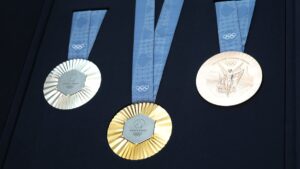
Before Ireland competed as an independent delegation at the Olympic Games in Paris in 1924, Irish-born people competed for other nations. Most competed for the United Kingdom, of which Ireland was a part until 1922, but several Irish-born athletes also competed for other nations in the early to mid-1900s. This was usually the United States and Canada or, in one case, South Africa – countries where the athletes had settled after emigration. Some of the athletes were victorious and brought medals back to their respective new homelands.
Cornelius ‘Con’ Walsh
Walsh represented Canada in the hammer throw at the 1908 Games in London. From Carriganima near Macroom, he played for Cork in the 1899 and 1901 All-Ireland football finals. Walsh took part in the local sports in Macroom and he almost beat the 56lb weight throwing world record in 1904 with a throw of 27 foot 2 inches. He won several GAA football place-kicking titles in the early 1900s.
Con Walsh: the Corkman who threw the hammer for Canada in 1908. Photo: Getty Images
After a move to America in 1907, Walsh became a member of the Irish American Athletic Club of New York, many of whose members worked for the New York City Police Department. Walsh was one of the so-called ‘Irish Whales’, a group of eight Irishmen who dominated weight-throwing competitions and earned the nickname thanks to their tall and robust physiques. They managed to win an amazing 23 medals at the Olympics. Walsh won a bronze medal in the hammer throw at the 1908 Games for Canada, having moved there from New York in 1907.
Kennedy ‘Ken’ McArthur
McArthur represented South Africa in the marathon at the 1912 Olympic Games in Stockholm. Born in Dervock, Co. Antrim, he emigrated to South Africa in 1901 at the age of 20, leaving behind his job as a postman. He joined the police and became a middle distance athlete. He trained by racing against a narrow-gauge railway train and won several competitions, including the South African cross country championships.
He took gold in the 1912 marathon with a time of 2 hours 36 minutes and 54 seconds, which was run in temperatures of around 32C. 64 runners from 19 countries took part in the race and half of those who started were forced to retire before the finish due to the unbearably hot July heat. The race is notable as one of the participants, the Portuguese runner Francisco Lázaro, died while taking part. His death is recorded as the first ever fatality during an Olympic event.
From BBC Northern Ireland, the story of Kennedy “Ken” McArthur, the Northern Irish man who won the 1912 Olympic marathon for South Africa
The bronze medal went to another South African runner, Christian Gitsham. McArthur and Gitsham had shared the lead in the race at the 17-mile mark. Gitsham stopped for water with two miles to go and came in around one minute after McArthur, who also took home a floating trophy and a bronze statue along with his gold medal. The statue was of Pheidippides, the man who is said to have run from Marathon to Athens to alert the authorities of the Athenian victory in the Battle of Marathon. It was donated by the King of Greece. There is an athletics stadium named for McArthur in his adopted hometown of Potchefstroom.
Dennis Fenton
Fenton was born in the Gaeltacht village of Ventry in Co. Kerry. He emigrated to the United States in 1906 and eventually joined the army. He was stationed in the Philippines for a time, where he developed his rifle skills on the shooting range. Fenton served briefly in China and helped to train recruits in Arizona during the First World War.
He represented the US in shooting at the 1920 Olympic Games in Antwerp and the 1924 Games in Paris. He won three golds in the team shooting events and a bronze in the individual small-bore rifle contest in Antwerp and a bronze in Paris. The bronze he won at the team event in Paris in 1924 was known as the ‘100 meter running deer’ as it involved competitors shooting at a deer-shaped target.
Ó RTÉ Raidió na Gaeltachta Saol Ó Dheas, trácht ar Dennis Fenton laoch Oilimpeach a bhuaidh boinn óir agus cré umha aige cluiche Oilimpeacha 1920 agus 1924
Beatrice Hill-Lowe
Meet the first Irish woman to win an Olympic medal. Born in the Co. Louth town of Ardee, she moved to South Wales at a young age with her family. She had been competing in archery competitions since the late 1890s. Archery was one of the only sports open to women at the 1908 Games in London. All of the 25 competitors in the women’s event represented Great Britain, guaranteeing them all three medals. The bronze medal that she won in 1908 is now in the County Museum in Dundalk.
Robert ‘Bobby’ Kerr
Kerr represented Canada at the 1904 Games in St. Louis and the 1908 Games in London. He was born in Enniskillen, Co. Fermanagh and emigrated to Canada with his family when he was five years of age. He won gold in the 200 meter final at the 1908 Games, beating two American sprinters, and also took bronze in 100 meters.
From Hamilton Sports Hall of Fame, profile of Bobby Kerr
The night before winning the gold medal, Kerr enjoyed a night of drinking and dancing. This was a drastic change to his normally strict training schedule but it obviously had no ill effect on his performance. He was selected to compete at the 1912 Games in Stockholm, but decided he was past his prime and chose to retire instead. He remained active as a coach and official and was manager of the Canadian team in Los Angeles in 1932. There is a park in his hometown of Hamilton, Ontario named in his honour.